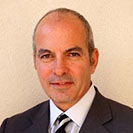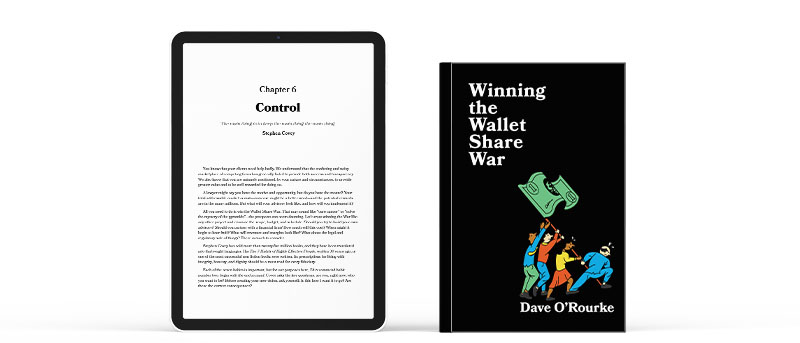Certified Public Accountants and Enrolled Agents Are Losing the Wallet Share War
You may not be aware of it, Certified Public Accountant (or Enrolled Agent), but you’re in a war—and you are losing that war. It’s a war to command the lion’s share of your client’s total expenditures for financial services. The typical CPA or EA captures less than 10% of that spending.
Sometimes it’s much less than that. Your client—the type of client you want—spends money on all kinds of financial services. His bank earns interest on his business loans and fees for account services. Her insurance broker rakes in big commissions on property and casualty coverage. Their life insurance salesman earns commissions on the policies he places. And their stock and bond expenses and fees are likely in the 2%-per-year range–and in some cases, much higher.
Meanwhile, a typical CPA may earn $1,000 per year for preparing and filing a personal return and maybe another $2,000 for a business return. And every time your client watches a football game, Intuit or H&R Block—or the new crop of AI-enabled tax preparation start-ups are offering to do their taxes for much less. So while the CPA is losing the broader war for financial services, they’re also in a race to the bottom.
Even if we put aside the bank and property & casualty products and just focus on asset protection and wealth management, that client with a $1 million account may well be paying other professionals over $20,000 per year. And here’s the irony: that client likely trusts you more. And here’s the truth: winning the wallet share war is much easier, less costly, and far less risky than you may imagine.
The Tax Pro’s Wallet Share is Grounded in Client Satisfaction
The tax pro is the consummate financial professional. You work harder for your credential than any stock broker or insurance salesperson. Much harder. A CPA needs a bachelor’s degree, needs to pass a grueling examination many call “Couldn’t Pass Again,” and then, in many jurisdictions, needs to spend a year on the job before you get your license.
By contrast, a new “financial advisor” could have been a terrible student who didn’t graduate (or even go to college) and just needs to pass the Series 65 and hit the pavement. The bar for insurance salespeople is even lower. While diligence, reliability, accuracy, and mastery of an 80,000-page code are required of you, your opponents in the Wallet Share War need only a brochure and a smile. Yet they gather 90% or more of the financial rewards.
It’s an unfair fight. You have to deal with the IRS and the tax courts; the salespeople only have to fight each other. There is another consideration, as well: your client. You want what’s best for them, but in the real world they often don’t get it. In that way, they also are a loser in the Wallet Share War.
The advice of a single-discipline practitioner—an insurance salesperson, a banker or financial advisor—is typically borne of a limited supply of choices, and even worse, a limited understanding of downstream implications. This is not to say that all singular practitioners are doing a poor job, or are evil in some way. The point is that advice without conflict—when the only objective is the best interests of the client—has advantages for the client that almost always produce better results.
Wanting guidance, your client consults an insurance pro. Can you imagine the pro not recommending some insurance-based solution? If the need is income, the answer is annuity. If it’s a growth vehicle, it’s universal life. And so on. The likelihood of them referring the client away to a financial advisor or a stock broker approaches zero.
When your client visits the banker, they may be offered a CD for income, or a mutual fund wrap program for growth. But send you away from the bank? Heavens no!
Same story with the typical registered investment advisor: they may offer a fee-based mutual fund or separately managed account, but the chances of them offering a bank or insurance product are slim and none.
The insurance pro, the banker, the advisor: all good people. Affable. Pillars of their community. Apparently trustworthy. But all are captive to whatever set of products are in their company’s portfolio. If it’s not in their briefcase, your client is not going to hear about it. This is just the way it is: the outcome for the advice giver is part of the equation. It’s not only the best interests of the client, so it begs the question: how can they be a true fiduciary?
CPAs and EAs are in a profession of trust. It is what your credential signifies, what you are educated and trained for, and it’s what your clients demand and expect. For the CPA, it’s also what your Code of Professional Conduct requires.
This unique position, a combination of deep knowledge of the client’s financial situation and inherent trustedness, gives CPAs the opportunity to reap substantial rewards by expanding the scope of their offers, but the risks entailed are substantial. The trick is to stay in the role of true fiduciary. Thousands of CPAs accomplish this by working in family offices.
The Family Office: 100% Wallet Share, 100% Happy Clients and 100% Employ Tax Professionals
Family offices are a special kind of financial organization that works directly for an ultra-wealthy family. There is no risk of conflict as everyone involved is working for the same outcomes–the welfare of the family–and the incentive structures are fully transparent and aligned with the family’s desires. Family offices virtually always have one or more tax professionals in a client-facing leadership role.
And family offices command 100% of the client’s wallet share. Family offices are, to many, by far the most successful form of wealth management entity. There are family offices that have been continually serving a family across multiple generations. The House of Morgan, the first family office in America, was established in 1838.
For those families who don’t have hundreds of millions or more to manage and protect, but are still seriously wealthy, there is the multi-family office, which caters to several or even dozens of clients, but still operates under the rubric of conflict-free true fiduciary. Again, these organizations virtually always have tax pros in client-facing Director roles.
The single and multi-family office model is a vehicle whereby the tax planning prescriptions of the CPA may be filled with discipline and transparency, and one in which the client’s welfare may be maximized with zero danger to the status and reputation of the professionals.
The problem with working as a Director in a single- or multi-family office is that the CPA becomes an employee, and not a business owner. For the CPA who enjoys owning and managing their own business, and one day cashing in on a substantial transition, this is simply a deal killer.
Tax Pros Embrace Caveat Venditor as Family Office Directors
Financial services generally operates under caveat emptor, or “buyer beware,” the principle that the buyer alone is responsible for assuring the quality and suitability of services before they buy. Better outcomes would occur for your clients under a different ethos: caveat venditor, or “seller beware.” Caveat venditor is associated with a fiduciary, not a salesperson.
Suppose the CPA tries to capture wallet share by becoming a salesperson, offering a product or service that is not objectively the best available for the specific concerns of their client. In that case, they are accountable not only for the quality and suitability of solutions provided, but of the ultimate outcome. If things were to go wrong, they could lose their brand, their reputation, and most importantly, their most-trusted status, the source of all good things for them.
This one fact freezes most CPAs out of the larger contest for client wallet share, and explains why, according to the AICPA, 75% of CPAs have made no effort to offer services beyond the traditional compliance, bookkeeping, dispute resolution and tax planning roles that define most tax practices.
CPAs, EAs, and Other Tax Pros Can Win the Wallet Share War With Zero Selling
Fortunately, there is a way for the entrepreneurial CPA or EA to win the Wallet Share War, and do so without becoming a salesperson, killing their productivity, or putting their most-trusted status at risk: partner with a multi-family office. Don’t become an employee, or sell your book of business. Instead, make the benefits of the family office approach and experience available to your clients.
Under this kind of partnership, the division of labor is elegantly simple. You handle tax planning, relationship management and ensure the integrity of the solutions proposed, and your MFO partner will do everything else.
You will want to do your homework. Your MFO partner will need substantial resources: a complete middle and back office solution, an operations and service team, and a comprehensive technology platform. They’ll need subject matter experts across the financial services spectrum, from estate planning to risk management to portfolio construction. They’ll need to provide agency-level marketing services. And most of all, they will need to be fully dedicated to the best interests of your client.
With this arrangement, you can enjoy multiple, diverse new revenue streams. You can live at the center of your client’s financial lives, and you can free yourself from working the low-margin clients that make tax season such drudgery.















